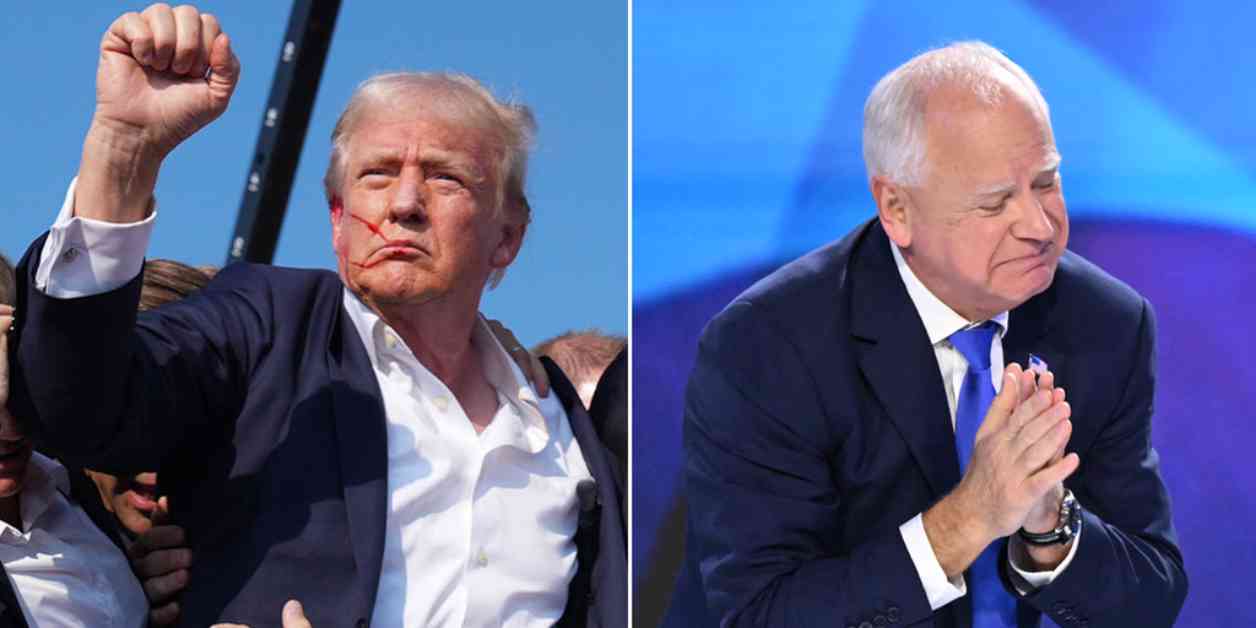Competing Visions of Masculinity in Trump-Harris Matchup
As the 2024 campaign heats up, the clash of competing visions of masculinity has taken center stage, with former President Trump and Vice President Harris embodying polarizing views. The debate over what it means to be a man in America today has sparked controversy and sparked discussions on traditional masculine values and their place in modern society.
The Masculine Divide: Trump’s Supporters vs. Harris’ Appeal
There is a clear divide between the supporters of former President Trump and those who are drawn to Vice President Harris. Some feel that male supporters of Trump are “stuck in the 1950s,” clinging to outdated notions of masculinity, while others argue that Harris attracts a different type of man – one who is comfortable in his own skin and supports women.
CNN’s Dana Bash weighed in on the topic, suggesting that the Democratic National Convention is working to win over men who may not fit the traditional mold of masculinity. She pointed to figures like Gov. Tim Walz and second gentleman Doug Emhoff as examples of male speakers who can connect with a broader audience beyond the stereotypical “testosterone-laden” image.
The Role of Leadership in Shaping Masculinity
Author Ronald Levant delves into the changing landscape of masculinity, highlighting the shift away from the traditional, rigid roles of the past. He points to Gov. Tim Walz as an example of a modern man who embodies a new model of masculinity – one that values empathy, connection, and family. Levant argues that Walz’s emotional display with his son Gus at the DNC illustrates a different kind of strength, one that is not solely based on bravado or dominance.
Psychotherapist Jonathan Alpert echoes the sentiment, emphasizing that the media’s portrayal of masculinity can further divide the electorate. He asserts that political affiliation does not dictate testosterone levels, and that strength can be demonstrated in various ways beyond traditional stereotypes of masculinity.
Doug Zarkin, a branding expert, emphasizes the importance of leadership qualities that transcend gender. He praises Walz for his authenticity and empathy, highlighting the substance behind his words as a testament to true strength. Zarkin argues that masculinity is not about conforming to a specific mold, but about connecting with others on a genuine level and leading with empathy.
Reframing Masculinity: Rejecting Toxic Narratives
White Dudes for Harris founder Mike Nellis challenges the notion of masculinity championed by figures like Hulk Hogan, advocating for a more inclusive and caring approach to manhood. He argues that true masculinity is about building strong communities and leading with love and hope, rather than clinging to outdated notions of toughness and bravado.
The Role of Media in Shaping Masculinity
While media portrayals of masculinity can influence societal perceptions, Dr. Alexa Chilcutt emphasizes that masculinity is a complex and multifaceted concept that goes beyond gender dynamics. She notes the cultural and generational shifts that have shaped contemporary ideals of masculinity, highlighting the diverse range of men who reject traditional stereotypes while still embodying strength and respect for women.
Chilcutt challenges the notion that masculinity is monolithic, pointing to the existence of men who are both alpha males and supportive of women. She argues that modern masculinity is not defined by adherence to specific norms or activities, but by a range of qualities that encompass strength, empathy, and respect.
The Trump-Harris Debate: A Reflection of Modern Masculinity
As the Trump-Harris matchup unfolds, it serves as a mirror reflecting the evolving debate over masculinity in America. While Trump embodies more traditional ideas of masculinity, emphasizing assertiveness and dominance, Harris represents a shift towards inclusivity and diversity in defining masculinity. The clash of these contrasting visions highlights the ongoing conversation around what it means to be a man in today’s society.
The Impact of Political Affiliation on Masculinity
The political divide between Trump’s supporters and Harris’ appeal underscores the complex relationship between masculinity and ideology. While some may view traditional masculine values as synonymous with conservative ideals, others argue that masculinity is not defined by political affiliation. The diverse range of men who support different candidates illustrates the multifaceted nature of masculinity and the varying ways in which it can be expressed.
Conclusion
In conclusion, the competing visions of masculinity in the Trump-Harris matchup reflect the broader societal debate over traditional values and evolving ideals of manhood. As the campaign progresses, it is essential to recognize the diversity of expressions of masculinity and the importance of challenging outdated stereotypes. By embracing a more inclusive and nuanced understanding of masculinity, we can move towards a more equitable and respectful society for all.





















